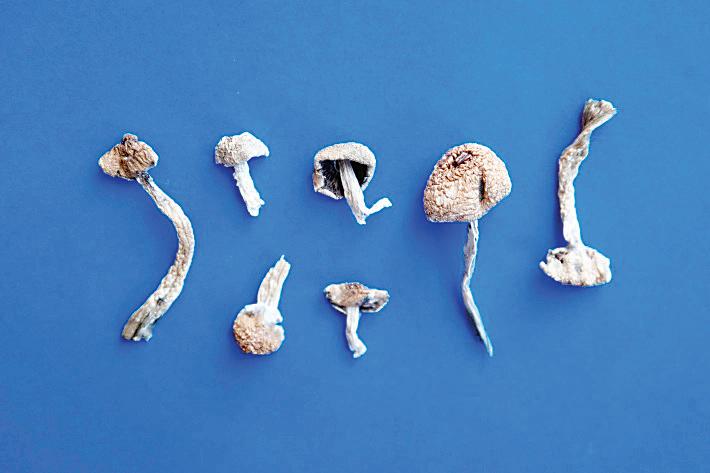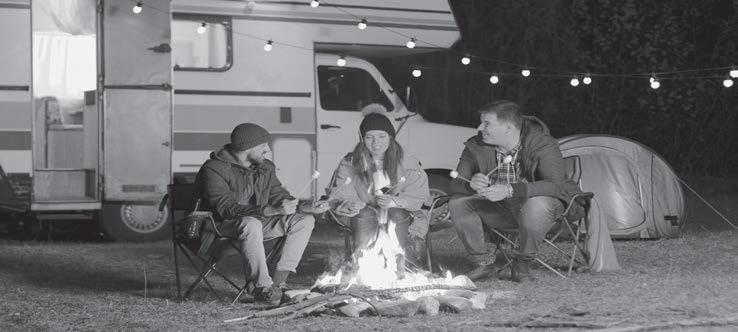
6 minute read
LEGAL
New research shows potential benefi ts from psychedelic fungi
BY THY VO THE COLORADO SUN
It wasn’t just the painful tumors or medication that made Alan Floyd sick.
It was the idea that death could come at any time, a brutal fact of his condition that came to dominate his days and grew into night terrors during his sleep.
“It was this monstrous, impending doom of death hanging over me,” Floyd said.
But Floyd found a way to interrupt the cycle of rumination and fear by experimenting with “magic” mushrooms. He’s one of many patients and spiritual seekers in Colorado who have sought healing and relief from mushrooms and other psychedelic substances, despite a federal prohibition.
Although recent research showing the healing potential of these drugs has spurred renewed interest, mushrooms and naturally derived psychedelics like mescaline, ibogaine and dimethyltryptamine, or DMT, have been used by people for centuries. It’s only in the past 50 years that they were considered illegal.
Now advocates are hoping Colorado will join Denver and a growing number of cities and states that are decriminalizing mushrooms and other psychedelics. They’re working on initiatives that, if approved for the November ballot, would ask voters to eliminate criminal penalties under state law for possession, use and cultivation of certain psychedelic substances.
The statewide effort comes after psychedelic drug advocates successfully passed a 2019 Denver measure that decriminalized adult possession and use of psilocybin, the psychoactive substance in so-called magic mushrooms, and made it the lowest priority for local law enforcement. But disagreements are forming already among advocates backing the effort over what statewide decriminalization should entail..
Kevin Matthews, a proponent of Denver’s 2019 decriminalization measure, is pushing initiatives to create a regulatory system that would allow people 21 and older to seek psychedelic therapy at statesanctioned centers.
Four initiatives have been approved by the state Title Board, and advocates are debating which one to petition onto the statewide ballot in November. Another camp of activists has put forward their own measure to decriminalize mushrooms and three other psychedelics without calling for further state regulations.
The move to decriminalize magic mushrooms in Colorado comes as Denver and jurisdictions across the U.S. have enacted laws to legalize use of psychedelic substances.
In 2020, Oregon voters passed measures legalizing psilocybin-assisted therapy at state-sanctioned centers and personal possession of small amounts of certain drugs. Voters in Washington, D.C., also passed an initiative decriminalizing possession of naturally derived psychedelics.
Shannon Hughes, an associate professor of social work at Colorado State University in Fort Collins, said underground guides have long been helping people access psychedelics to treat health issues, explore their spirituality and experiment recreationally. Hughes serves on the board of a Colorado group that promotes safe exploration of psychedelics.
“There are folks who have been doing this work for a very long time, but because it’s underground, they can’t really talk about their experience without fear of criminal risk,” Hughes said. “All we get access to is how it’s getting medicalized.”

Denver was the fi rst U.S. city to decriminalize possession and use of psilocybin in May 2019. Some advocates, pursuing statewide initiatives, hope to see the decriminalization of “magic mushrooms” and other psychedelic compounds statewide.
PHOTO BY OLIVIA SUN/THE COLORADO SUN VIA REPORT FOR AMERICA
MARIJUANA
“Does it matter if there’s grow facilities right next to each other, or manufacturing facilities right next to each other?” asked Walsh, who represents Simply Pure dispensary and Black Brown and Red Badged, a trade group for cannabis entrepreneurs of color. “Look at our entire downtown area. There’s brewery next to brewery next to brewery. There’s bar next to bar next to bar. No one really bats an eye about that.”
Since the city’s social equity program started in June, the city has received 36 applications from social equity applicants who want to own dispensaries, delivery companies, cultivation sites and hospitality businesses. Of those, 19 are pending, 13 have been approved and four applications have been denied, said Eric Escudero, director of communications for the Denver Department of Excise and Licensing, the regulatory authority creating and enforcing cannabis rules in the city.
In the same period, the city has processed 642 proximity checks for social equity applicants and for existing cannabis retail owners looking for a better location, and just 113 of those spots would likely meet the zoning rules for a new cannabis business, Escudero said.
“The idea of, ‘There aren’t locations,’ it’s just not true,” Escudero said. “It’s hard to fi nd a location. But saying there are no locations — it’s just not factually accurate.”
About 70% of Denver is zoned residential only and therefore ineligible for commercial uses, he said, making it harder for equity applicants to fi nd a space.
Rayshawne Thomas grew up in Montbello, a northeast Denver neighborhood that was heavily impacted by the war on drugs, the government-led initiative that aimed to stop illegal drug use, distribution and trade by dramatically increasing prison sentences for people convicted of possessing and dealing illicit drugs. As a kid, he watched police stop and frisk people and arrest some of them for possession of marijuana and other petty drug offenses.
When the Denver Social Equity Program emerged, Thomas, who comes from a family of farmers, felt qualifi ed. But after spending $5,000 and after searching for eight months for a location that would meet zoning rules, Thomas said he knew there would be no place for him to start his growing business in Denver.
Since then, he has applied for his state cultivation license and recently received a local license to operate his new growing operation, Growzillas5280 Farms, in the cannabisfriendly San Luis Valley. Although the three-hour drive from his home in Denver to his farm in Moffat puts stress on his vehicles, and networking in a rural area is much harder, Thomas said he’s committed to making his business as successful as possible.
When he began his search for a location in Denver, Thomas said others had told him the process would feel like fi nding a needle in a haystack.
“That’s not true,” he said, “it’s like fi nding water in a desert. I am very persistent and I work hard, so, when I gave up, I knew that it was just not there.”
There are 206 cannabis retail store locations in Denver alone. None are within 1,000 feet from another cannabis business, day care, school or drug treatment facility.
City leaders have stood fi rm in rejecting requests to waive the 1,000foot rule and have said it is in place to reduce youth cannabis usage.
Many people against legalization had predicted use by kids would skyrocket after pot was legalized
No Clipping Required.
The AARP® Auto Insurance Program from The Hartford.1
FREE duffel bag when you request your free quote!3

ON AVERAGE, AARP MEMBERS ENJOY $5072 SAVINGS
ON AUTO INSURANCE when they switch from companies like GEICO, State Farm and Allstate
Your savings could be even more!
Call The Hartford 1-833-498-1989
Call The Hartford now to request a FREE money-saving quote. 1-833-498-1989

Find Your Perfect RV Rental!
RVshare connects millions of renters to the perfect RV rental and provides a safe, secure booking experience.


